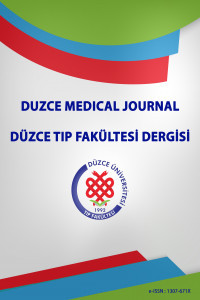TRAVMAYA BAĞLI OLUŞAN İNTRASEREBRAL VE İNTRAORBİTAL APSENİN ENDOSKOPİK TEDAVİSİ
Beyin absesi, kafa travması, endoskopik sinüs cerrahisi
Endoscopic Treatment of Intracerebral and Intraorbital Abscess due to Trauma
Brain abscess, head trauma, endoscopic sinus surgery,
___
Carpenter J, Stapleton S, Holliman R: Retrospective analysis of 49 cases of brain abscess and review of the literature. Eur J Clin Microbiol Infect Dis. 2007; 26(1):1-11.Sennaroğlu L: Beyin Absesi. T Klin J E N T. 3:162-167,2003.
Kaplan K: Brain Abscess. Med Clin North Am. 1985; 69: 345 -360.
Chun HC, Johson JD, Hofstetter M. Brain Abscess: A study of 45 consecutive cases. Medicine. 1986; 65: 415-43.
Wispelwey B, Scheld WM: Brain abscess. In Mandell GL, Bennett JE, Dolin R (ed): Principles and Practice of Infectious Diseases, 4 th ed. New York. Churchill Livingstone, 1995.
Yang S – Y. Brain Abscess: A review of 400 cases. J Neurosurg. 1981; 55: 794 -799.
Wispelwey B, Dacey RG Jr, Scheld WM: Brain Abscess. In Scheld WM, Whitley RJ, Durack DT (ed): Infections of the Central Nervous System. New York. Raven Press, 1991.
Mandell, Douglas and Bennett’s. 2000. Principles and Practice of Infectious Diseases: Chapter 74:1016-1028.
Menkes J, Sarnat H. 2000. Childhood Neurology. 6. Edit. Chapter 6: 500-6.
Bavetta S, Paterakis M, Srivatsa SR, Garvan N. Brainstem abscess: Preoperative MRI appearance and survival following stereotactic aspiration. J Neurosurg Sci. 1996; 40: 139 -143.
Chacko AG, Chandy MJ: Diagnostic and staged stereotactic aspiration of multipl bihemispheric pyogenic brain abscess. Surg Neurol. 1997; 48: 278-282.
Fritsch M, Manwaring KH: Endoscopic treatment of brain abscess in children. Minim Invasive Neurosurg. 1997; 40: 103 -106.
Longatti P, Perin A, Ettorre F, Fiorindi A, Baratto V: Endoscopic treatment of brain abscesses. Childs Nerv Syst. 2006; 22(11):1447-50.
Skrap M, Melatini A, Vassallo A, Sidoti C: Stereotactic aspiration and drainage of brain abscess: Exprience with 9 cases. Minim Invasive Neurosurg. 1996; 39: 108 – 112.
Shahzadi S, Lozano AM, Bernstein M: Stereotactic management of bacterial brain abscesses. Can J Neurol Sci. 1996; 23: 34 – 39.
Sarmast AH, Showkat HI, Bhat AR, Kirmani AR, Kachroo MY, Mir SF, Khan AA: Analysis and management of brain abscess; a ten year hospital based study. Turk Neurosurg. 2012; 22: 682-689.
- Yayın Aralığı: Yılda 3 Sayı
- Başlangıç: 1999
- Yayıncı: Düzce Üniversitesi Tıp Fakültesi
Tuba DAL, Recep TEKİN, Özcan DEVECİ, Safinaz DEMİRKAYA, Mahmut METE, Saim DAYAN, Alicem TEKİN
İleusun Nadir Nedeni: Hidatik Hastalık Komplikasyonu
İDRAR KÜLTÜRLERİNDEN İZOLE EDİLEN ESCHERİCHİA COLİ SUŞLARI’NIN ANTİBİYOTİK DİRENÇ PATERNİ
Bilge GÜLTEPE, Ayşenur CEYLAN, Mehmet Ziya DOYMAZ, Meryem IRAZ
Enver İLHAN, Zehra Hilal ADIBELLİ, Mehmet Akif ÜSTÜNER, Abdullah ŞENLİKÇİ, Emrah DADALI, Uğur GÖKÇELLİ, Ayşe YAĞCI, Hilmi GÜNGÖR, Orhan ÜREYEN
NADİR GÖRÜLEN DİL KÖKÜ SCHWANNOMU: OLGU SUNUMU
Altay ATEŞPARE, Zerrin BOYACI, Neşe YENER, Öner ÇELİK
Mehmet GÜNEY, Yasemin TÜRKER, Funda Yıldırım BAŞ
Siyatik Sinir Yaralanmasi: Adli Olgular
Muhammed Ziya KIR, Sadık ŞAHİNGÖZ, Yüksel ANCI, Ahmet Nezih KÖK, Mustafa Talip ŞENER
